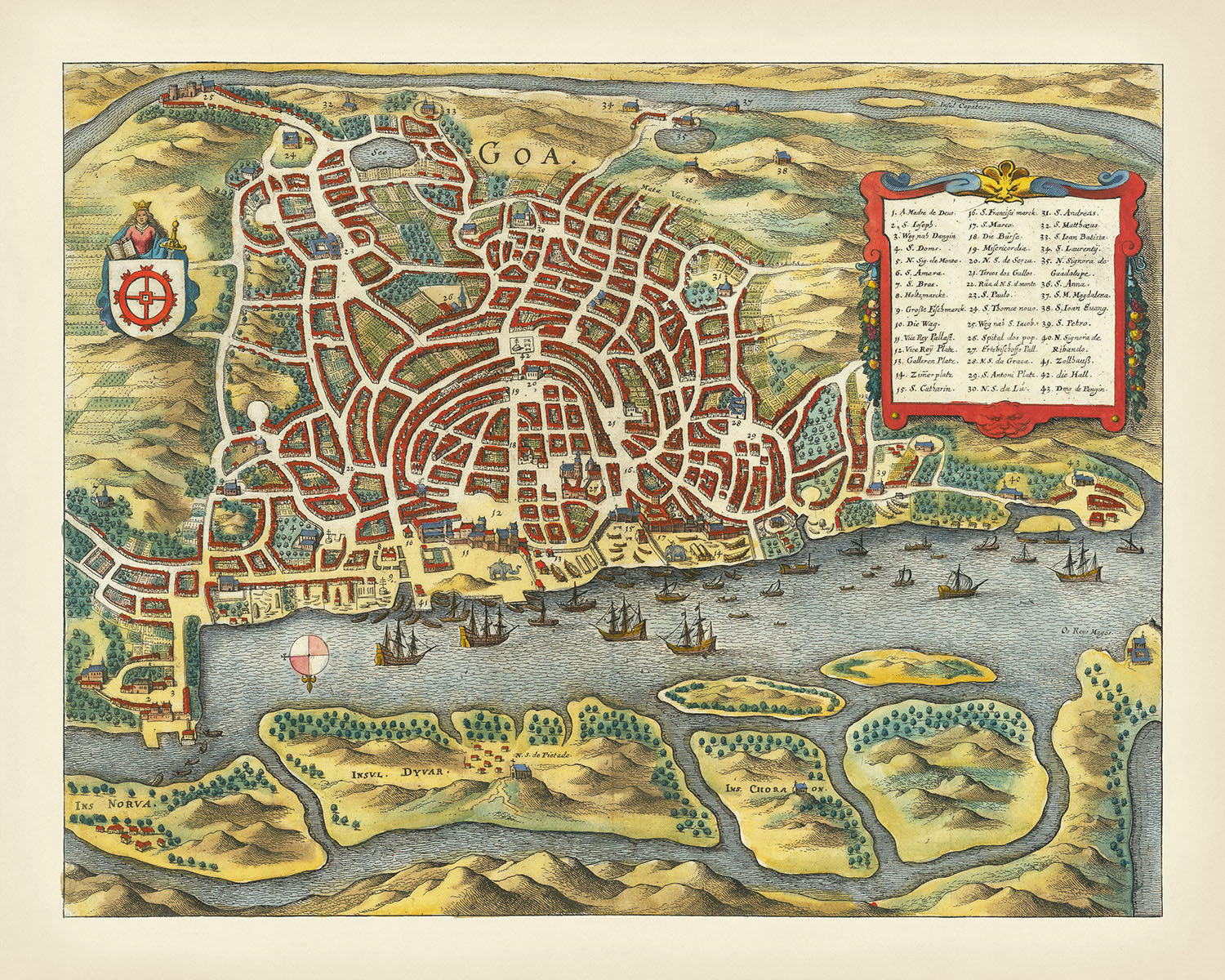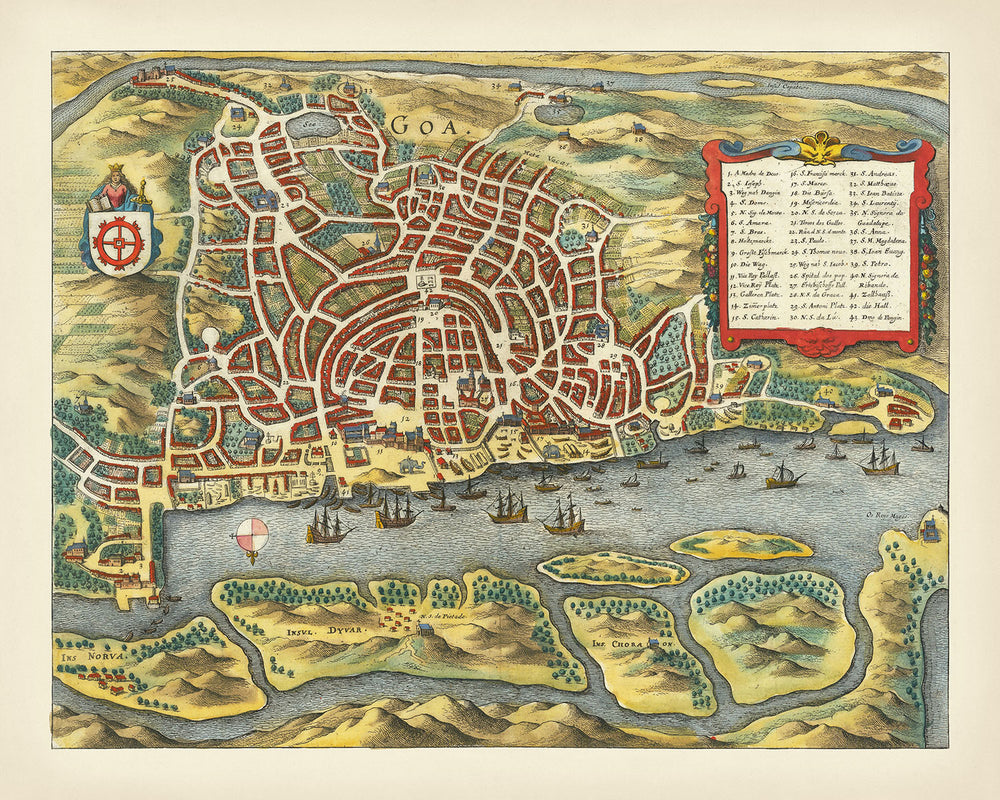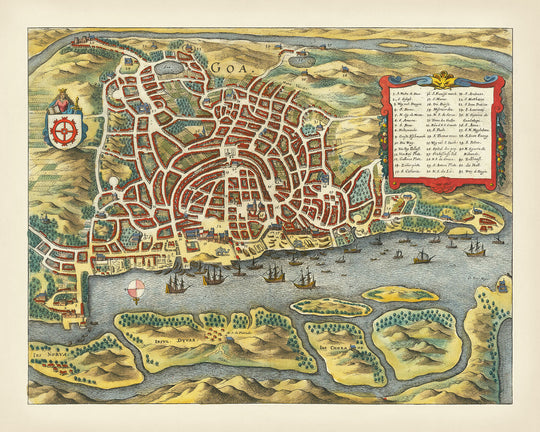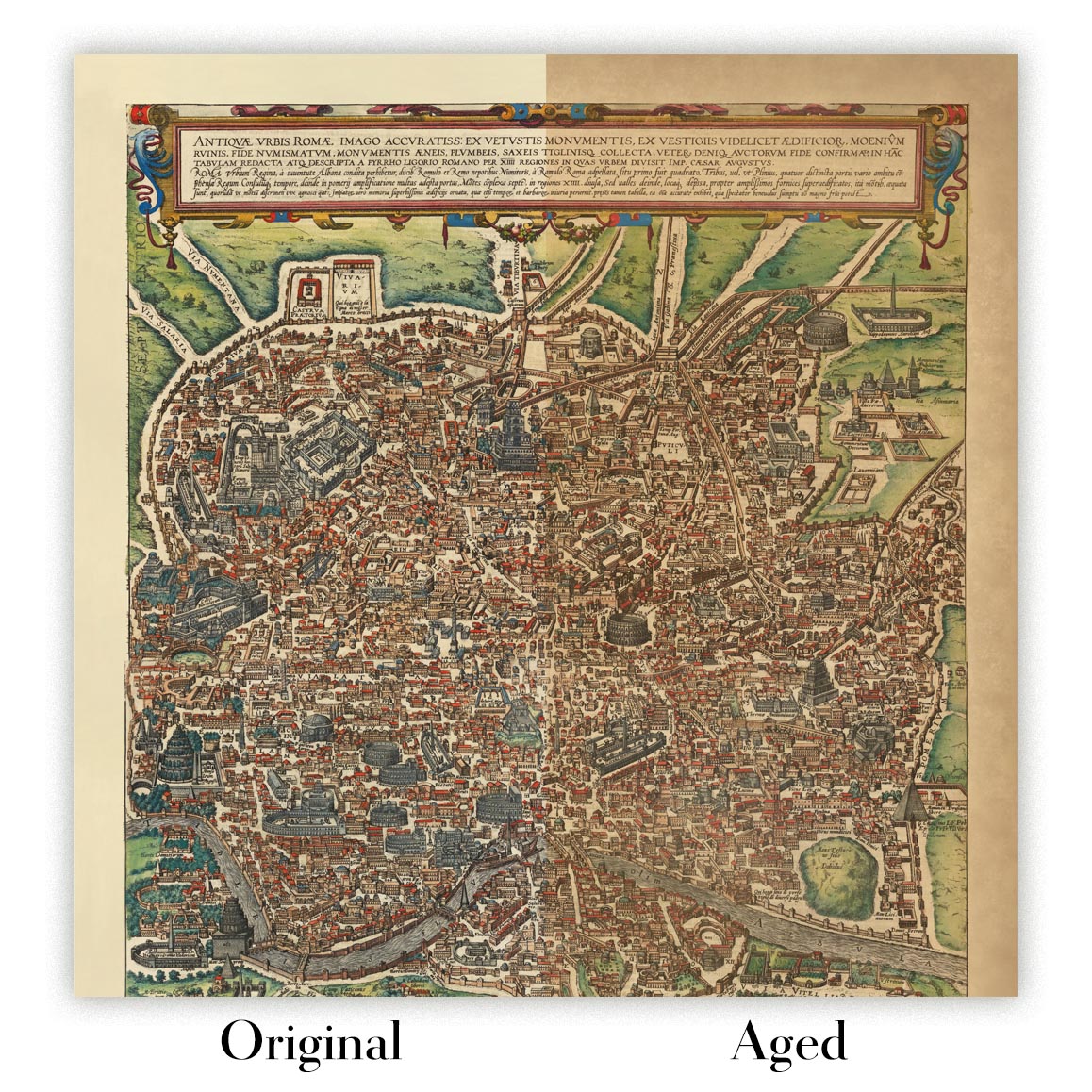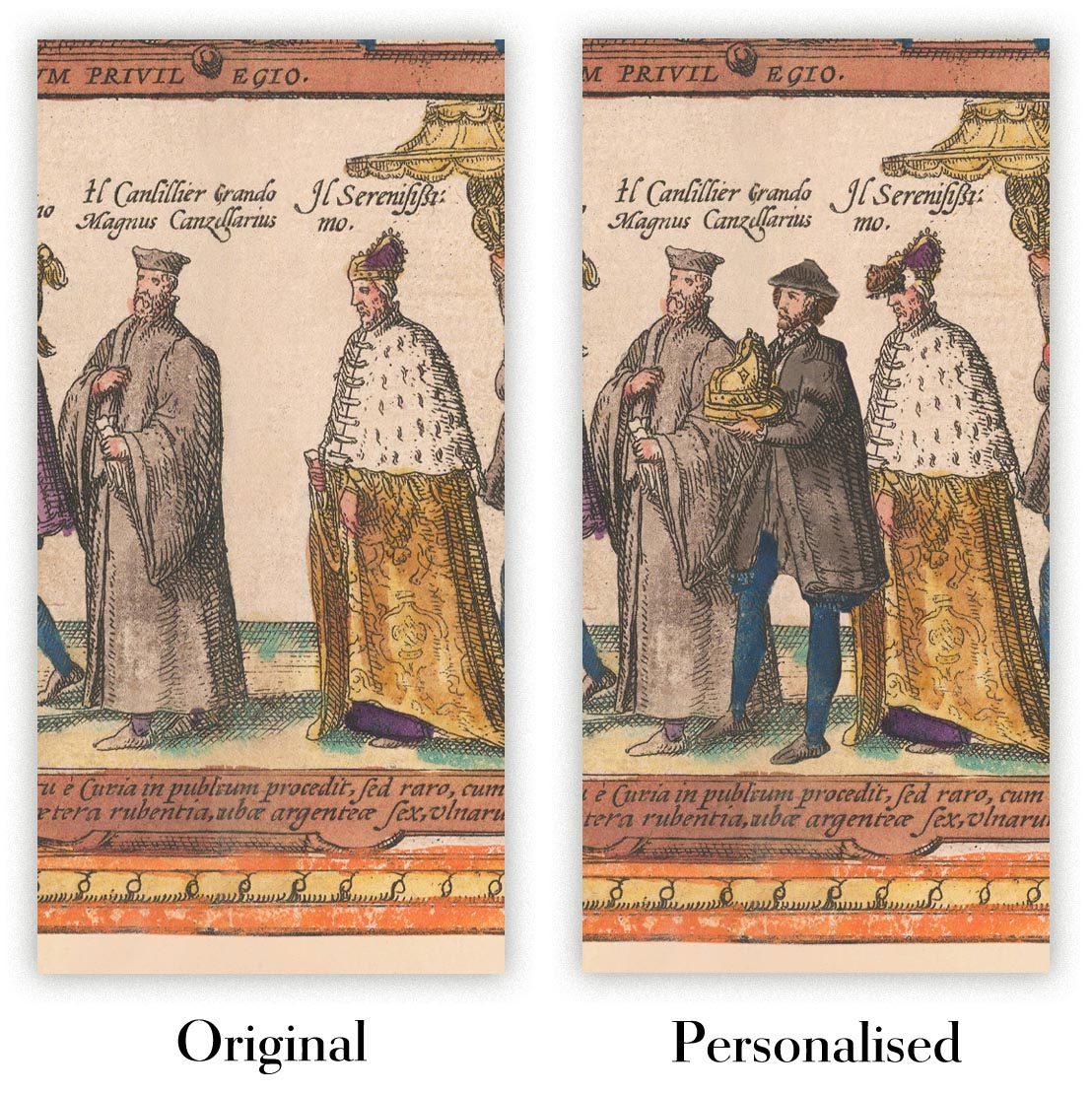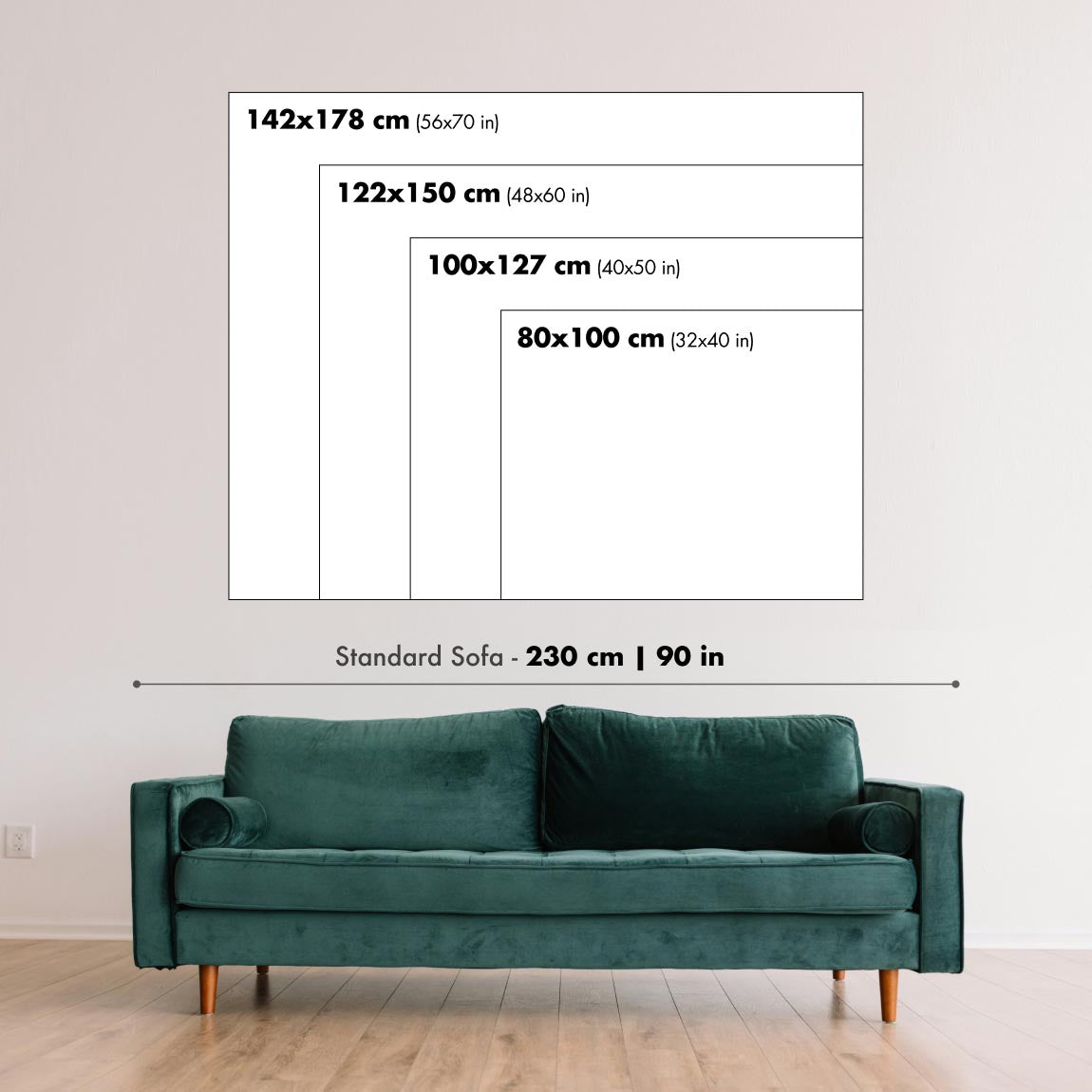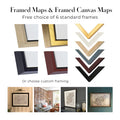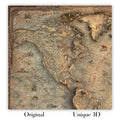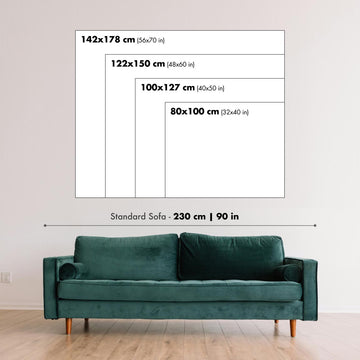- Handmade locally. No import duty or tax
- FREE worldwide delivery
- 90-day returns & 5-year product guarantee
- Questions? WhatsApp me any time
Own a piece of history
7,000+ 5 star reviews


The "Birdseye View Plan of Goa" by Matheus Merian, created in 1650, is a captivating glimpse into the historic city of Goa during its peak as a bustling Portuguese colony. This meticulously detailed map offers a unique aerial perspective, showcasing the intricate layout of the city’s streets, buildings, and its riverine harbor. The map’s artistic flourishes, including a compass rose and a coat of arms depicting St. Catherine, add to its visual appeal and historical significance. Merian’s work is not just a map but a piece of art that reflects the cartographic tastes of the mid-17th century.
Goa, now a state in western coastal India, was once a central trading hub with a population of up to 200,000. This map captures the city’s vibrant life before it was abandoned in the 18th century due to a plague. Significant landmarks such as the Church of St. Francis near the water and the shrine on the hills to the east, then dedicated to St. Bras, are prominently featured. The map also highlights the palace of the Viceroy of Goa along the river, a testament to the city’s political importance during the Portuguese rule.
The map extends to the surrounding areas, including Insula Dyvar (Divar Island) and Ins. Chora (likely Chora Island), offering a broader view of the region’s geography. The depiction of the Zuari River in the background adds to the map’s depth, illustrating the natural waterways that were crucial to Goa’s trade and transport. The inclusion of these geographical features provides a comprehensive understanding of the area’s layout and its strategic significance.
Merian’s map is drawn heavily from Linschoten’s rare 1596 view, based on his travels to the city. This historical connection adds another layer of intrigue, as it reflects the evolution of cartographic techniques and artistic preferences over half a century. The map’s detailed index, naming forty-three points of interest in German, serves as a valuable guide to the city’s notable sites, offering insights into the daily life and structure of Goa during this period.
This birdseye view is not only a beautiful representation of Goa but also a significant historical document. It captures a moment in time when Goa was a thriving center of commerce and culture under Portuguese rule. The map’s artistic and historical value makes it a remarkable piece for collectors and history enthusiasts alike, offering a window into the past and a deeper appreciation of Goa’s rich heritage.
Streets and roads on this map
- Rua de S. Bras
- Rua de S. Francisco
- Rua de S. Joao
- Rua de S. Paulo
- Rua de S. Roque
- Rua de S. Sebastiao
Notable Features & Landmarks
- Illustrations:
- Coat of arms: Depicts St. Catherine's wheel with the saint holding a sword and a book.
- Ships: Several ships are depicted in the harbor.
- Landmarks:
- Church of St. Francis: Near the water.
- Shrine of St. Bras: On the hills to the east.
- Palace of the Viceroy of Goa: Along the river.
- Neighbourhoods:
- Insula Dyvar: Divar Island.
- Ins. Chora: Likely Chora Island.
- Lakes:
- River: The map extends to a river in the background, likely the Zuari.
Historical and design context
- Name of the map: A birdseye view plan of Goa.
- Creation date: 1650.
- Mapmaker/Publisher: Matheus Merian.
- Matheus Merian was a notable engraver and publisher known for his detailed and artistic maps.
- Topics and themes:
- City layout: Shows the detailed streets and buildings of Goa.
- Harbor: Depicts the city's riverine harbor.
- Surrounding fields: Includes fields and rural areas around the city.
- Decorative features: Contains artistic elements such as a compass rose, coat of arms, and illustrations.
- Countries and regions shown:
- Goa: A region in western coastal India, which was a Portuguese colony until 1961.
- Divar Island: Labeled as Insula Dyvar.
- Chora Island: Likely Ins. Chora on the map.
- Design/Style:
- Birdseye view: Pictorial map providing a detailed aerial perspective of the city.
- Artistic details: Reflects the cartographic tastes of the mid-17th century.
- Index of points of interest: Includes a key naming forty-three points of interest, indexed in German.
- Historical significance:
- Portuguese Goa: Once a central trading hub with a population of up to 200,000.
- Abandonment: The city was abandoned in the 18th century due to a plague.
- Viceroy's Palace: The palace was moved to Panaji in 1759.
- Spanish rule: The coat of arms may have been created during the brief Spanish rule in Goa.
- Archontologia Cosmica: The map comes from Merian's collection of works.
Please double check the images to make sure that a specific town or place is shown on this map. You can also get in touch and ask us to check the map for you.
This map looks great at every size, but I always recommend going for a larger size if you have space. That way you can easily make out all of the details.
This map looks amazing at sizes all the way up to 50in (125cm). If you are looking for a larger map, please get in touch.
The model in the listing images is holding the 16x20in (40x50cm) version of this map.
The fifth listing image shows an example of my map personalisation service.
If you’re looking for something slightly different, check out my collection of the best old maps to see if something else catches your eye.
Please contact me to check if a certain location, landmark or feature is shown on this map.
This would make a wonderful birthday, Christmas, Father's Day, work leaving, anniversary or housewarming gift for someone from the areas covered by this map.
This map is available as a giclée print on acid free archival matte paper, or you can buy it framed. The frame is a nice, simple black frame that suits most aesthetics. Please get in touch if you'd like a different frame colour or material. My frames are glazed with super-clear museum-grade acrylic (perspex/acrylite), which is significantly less reflective than glass, safer, and will always arrive in perfect condition.
This map is also available as a float framed canvas, sometimes known as a shadow gap framed canvas or canvas floater. The map is printed on artist's cotton canvas and then stretched over a handmade box frame. We then "float" the canvas inside a wooden frame, which is available in a range of colours (black, dark brown, oak, antique gold and white). This is a wonderful way to present a map without glazing in front. See some examples of float framed canvas maps and explore the differences between my different finishes.
For something truly unique, this map is also available in "Unique 3D", our trademarked process that dramatically transforms the map so that it has a wonderful sense of depth. We combine the original map with detailed topography and elevation data, so that mountains and the terrain really "pop". For more info and examples of 3D maps, check my Unique 3D page.
For most orders, delivery time is about 3 working days. Personalised and customised products take longer, as I have to do the personalisation and send it to you for approval, which usually takes 1 or 2 days.
Please note that very large framed orders usually take longer to make and deliver.
If you need your order to arrive by a certain date, please contact me before you order so that we can find the best way of making sure you get your order in time.
I print and frame maps and artwork in 23 countries around the world. This means your order will be made locally, which cuts down on delivery time and ensures that it won't be damaged during delivery. You'll never pay customs or import duty, and we'll put less CO2 into the air.
All of my maps and art prints are well packaged and sent in a rugged tube if unframed, or surrounded by foam if framed.
I try to send out all orders within 1 or 2 days of receiving your order, though some products (like face masks, mugs and tote bags) can take longer to make.
If you select Express Delivery at checkout your order we will prioritise your order and send it out by 1-day courier (Fedex, DHL, UPS, Parcelforce).
Next Day delivery is also available in some countries (US, UK, Singapore, UAE) but please try to order early in the day so that we can get it sent out on time.
My standard frame is a gallery style black ash hardwood frame. It is simple and quite modern looking. My standard frame is around 20mm (0.8in) wide.
I use super-clear acrylic (perspex/acrylite) for the frame glass. It's lighter and safer than glass - and it looks better, as the reflectivity is lower.
Six standard frame colours are available for free (black, dark brown, dark grey, oak, white and antique gold). Custom framing and mounting/matting is available if you're looking for something else.
Most maps, art and illustrations are also available as a framed canvas. We use matte (not shiny) cotton canvas, stretch it over a sustainably sourced box wood frame, and then 'float' the piece within a wood frame. The end result is quite beautiful, and there's no glazing to get in the way.
All frames are provided "ready to hang", with either a string or brackets on the back. Very large frames will have heavy duty hanging plates and/or a mounting baton. If you have any questions, please get in touch.
See some examples of my framed maps and framed canvas maps.
Alternatively, I can also supply old maps and artwork on canvas, foam board, cotton rag and other materials.
If you want to frame your map or artwork yourself, please read my size guide first.
My maps are extremely high quality reproductions of original maps.
I source original, rare maps from libraries, auction houses and private collections around the world, restore them at my London workshop, and then use specialist giclée inks and printers to create beautiful maps that look even better than the original.
My maps are printed on acid-free archival matte (not glossy) paper that feels very high quality and almost like card. In technical terms the paper weight/thickness is 10mil/200gsm. It's perfect for framing.
I print with Epson ultrachrome giclée UV fade resistant pigment inks - some of the best inks you can find.
I can also make maps on canvas, cotton rag and other exotic materials.
Learn more about The Unique Maps Co.
Map personalisation
If you're looking for the perfect anniversary or housewarming gift, I can personalise your map to make it truly unique. For example, I can add a short message, or highlight an important location, or add your family's coat of arms.
The options are almost infinite. Please see my map personalisation page for some wonderful examples of what's possible.
To order a personalised map, select "personalise your map" before adding it to your basket.
Get in touch if you're looking for more complex customisations and personalisations.
Map ageing
I have been asked hundreds of times over the years by customers if they could buy a map that looks even older.
Well, now you can, by selecting Aged before you add a map to your basket.
All the product photos you see on this page show the map in its Original form. This is what the map looks like today.
If you select Aged, I will age your map by hand, using a special and unique process developed through years of studying old maps, talking to researchers to understand the chemistry of aging paper, and of course... lots of practice!
If you're unsure, stick to the Original colour of the map. If you want something a bit darker and older looking, go for Aged.
If you are not happy with your order for any reason, contact me and I'll get it fixed ASAP, free of charge. Please see my returns and refund policy for more information.
I am very confident you will like your restored map or art print. I have been doing this since 1984. I'm a 5-star Etsy seller. I have sold tens of thousands of maps and art prints and have over 5,000 real 5-star reviews. My work has been featured in interior design magazines, on the BBC, and on the walls of dozens of 5-star hotels.
I use a unique process to restore maps and artwork that is massively time consuming and labour intensive. Hunting down the original maps and illustrations can take months. I use state of the art and eye-wateringly expensive technology to scan and restore them. As a result, I guarantee my maps and art prints are a cut above the rest. I stand by my products and will always make sure you're 100% happy with what you receive.
Almost all of my maps and art prints look amazing at large sizes (200cm, 6.5ft+) and I can frame and deliver them to you as well, via special oversized courier. Contact me to discuss your specific needs.
Or try searching for something!







